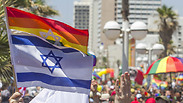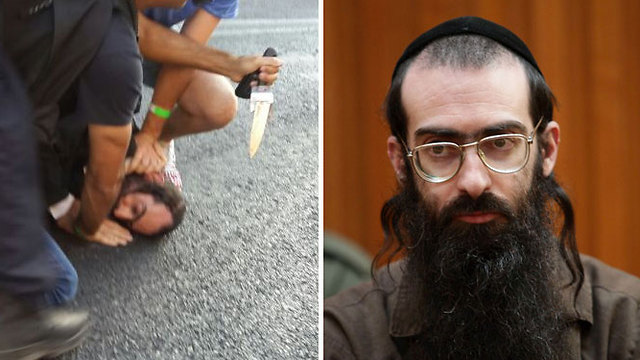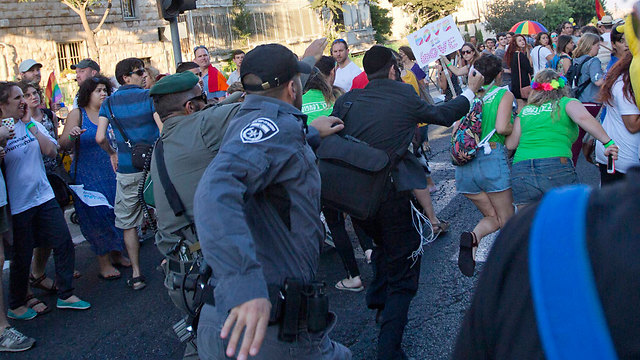
6 stabbed in Jerusalem gay pride parade
Arrested suspect identified as Yishai Shlissel after six marchers in Jerusalem evacuated to hospital; attacker previously wounded three in stabbing at 2005 Jerusalem gay pride parade.
Six people were stabbed Thursday afternoon during Jerusalem's annual gay pride parade and one Haredi suspect was arrested and identified as Yishai Shlissel, who carried out a similar attack in 2005 in which three marchers were wounded.
The wounded received treatment at the scene and were evacuated to hospitals. Four remained hospitalized past midnight, including a 16-year-old girl who's life was still in danger.
Shlissel was imprisoned for the stabbing in 2005. He was originally sentenced to 12 years in prison, but was released early, just one month ago, on good behavior.
In a statment from his office, Prime Minister Benjamin Netanyahu responded to the attack,
"We are talking about a very serious incident," he said. "We will find justice with the perpetrators. In the State of Israel the freedom of personal choice is one of the basic values we cherish. We must guarantee that in Israel, every man and women will live in safety in any way they choose."
Criticism of security forces was quick to hit social media. Concerned parties suggested that Shlissel shouldn't have been released or should have been carefully monitored leading up to the gay pride parade.
Officers providing security at the march were given intelligence reports along with the profiles of suspect individuals who could interfere with the parade or try to harm those marching. Shlissel's profile was included in the reports.
Interior security minister Gilad Erdan convened a meeting following the event to address the concerns, and decided to appoint a special investigation team to examine the circumstances of the stabbing.
Cameras caught Shlissel's arrest on film.
Marchers gathered at a Hapomoniem Garden at the end of the march where public figures made emotional speeches against the attack.
Tel Aviv's gay center also held a vigil Thursday night in solidarity with the victims of the attack.
The event in the ancient city has drawn resistance from relgious groups in the past, including in 2005 when Shlissel stabbed three marchers during clashes between dozens of ultra-Orthodox Jews and thousands of parade supporters.

The attack came just minutes into Jerusalem's yearly gay pride parade, which began with a lighter atmosphere. Thousands were in attendence, including government officials from the Meretz party and the Zionist Union.
Over 500 attended 2014's parade, which included tourists and even members of East Jerusalem's Arab gay community. The event is considered controversial by many, and regularly faces protest from right-wing organizations.












